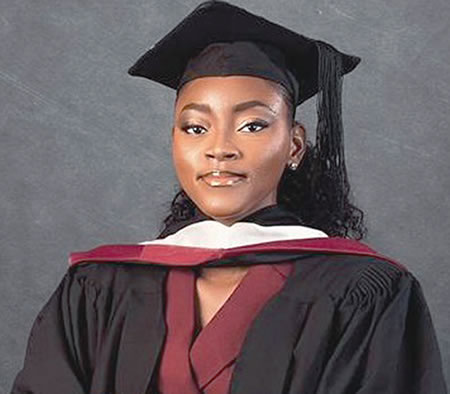Oluwaseyi Oyebanji is a culture and travel enthusiast. She graduated from the Department of History and International Studies, Babcock University, in the 2023-2024 session with a cumulative Grade Point Average (CGPA) of 4.54 on a scale of 5. In this interview by AWAU ADEGOKE, she speaks on her academic journey, her passion for diplomacy, and other issues.
How can you describe the kind of secondary education you had, and how did it prepare you for your university education?
I completed my secondary education at the Horizon Schools Lusaka, now known as Kabulonga Trust Schools, in Zambia. The experience was phenomenal, offering me a well-rounded education in various subjects. Although I was an art student in Nigeria, moving to Zambia required me to study biology, physics, chemistry, and principles of accounting ─ subjects I had not encountered before. This made me realise my academic potential and increased my desire for knowledge. I also discovered my academic strengths during this time, which proved invaluable for my tertiary education.
What influenced you to study History and International Studies? And, why Babcock University?
When I was younger, I aspired to be a lawyer until a seminar in JSS 3 changed my mind. I told my mom I no longer wanted to be a lawyer and she asked about my favorite subjects, which were French and Geography at the time. That day was the first time I heard the word ‘Diplomat’. After researching it, I decided to study International Relations. My passion for the international community and culture grew when I moved to Zambia and attended an international school, which broadened my perspective on the world.
After my secondary education, I received a scholarship to Xiamen University in Malaysia and could have attended top universities in Zambia and Southern Africa due to my grades. However, my parents preferred Babcock University, where History and International Studies was the closest option to International Relations, and I do not regret accepting their decision. Like I had a choice anyway.
What aspects of your course interested you more and why?
Interesting question. Having studied History and International Studies, I have realised that these two fields are connected. Although international relations (which is a component of international studies), focuses on current affairs — understanding the past is important to solving today’s problems. I believe our country would be much better if historians were guiding and drafting policies, given their understanding of the nation’s and other nations’ past.
Taking a look into past mistakes and successes is important in making strategic decisions for the nation. Learning about various countries, their evolutions, and cultures has been the most interesting aspect of studying History and International Studies.
To make a First Class is not easy. What did you do differently to achieve this feat?
Firstly, I owe my success to God’s grace and favour, the encouragement of my parents, the dedicated efforts of my lecturers, and my determination to excel.
Despite consistently achieving near first-class grades, I refused to relent. I began writing down goals and praying over them. I never dwelled on setbacks but saw them as an opportunity to do better and be better.
For other students out there, I highly recommend first recognising your academic strengths. For me, it was watching YouTube videos rather than studying, and that worked great. Another strategy is writing down your academic goals and constantly reviewing them. This would help you visualise your goals and easily keep track of your progress.
What was the title of your final-year project and what were the major findings from it?
My final-year project was titled ‘Nigeria-Brazil relations 1960-2023’. The major findings of the research showed that Nigeria and Brazil have a rich historical connection and have been working together in areas such as agriculture, trade, and culture. However, there remains a lot of untapped potential for an even stronger and beneficial relationship. The research project looked at the challenges and opportunities in the relationship between the two countries and made recommendations for how to improve it.
You have an advanced fluency in French and a diploma in Spanish. Given that these languages are vital to the course you studied, how do they translate to money for you and how do they enhance your social capital and network?
I believe language skills are an added advantage in my career as a diplomat because language is a form of communication and communication is a vital part of diplomacy and foreign relations. I improve my language skills by conversing with locals and watching videos in the foreign languages I am learning. Nations cannot agree if there is a breach in communication and understanding. A good diplomat should be able to learn, understand and speak at least one foreign language. So, my language skills in French and Spanish are a plus for me now and in the future.
In your LinkedIn bio, you stated that you are an “aspiring diplomat with an immense passion for travel and culture.” What are you doing to translate this “immense passion” into reality?
As I earlier mentioned, I am brushing up on my language skills, communicating with locals and watching films, documentaries and videos in my target languages. I have equally buried myself in books, movies and YouTube videos on diplomacy, travel and culture. My favourite travel book at the moment is ‘The Catch Me If You Can’ by Jessica Nabongo, who was the first and currently only black woman to travel around the globe. My favourite travel content creator at the moment is ‘Yes Theory’.
What kind of diplomat are you aspiring to become? If you were to serve as a Nigerian ambassador to any country, which country would you prefer and why?
I would like to be a cultural attaché or a cultural diplomat because I know how much cultural diplomacy can unite people from different backgrounds and build a strong foundation for more collaborations between states.
Honestly, it would be an honour to represent my country in any nation because each nation is unique and its uniqueness provides Nigeria with an opportunity to build and maintain meaningful relationships for mutual benefits.
What are the roles of history and international relations in restoring the seemingly negative image Nigeria and Nigerians are known for among most international organisations and countries?
In one word ‘Diplomacy’. I believe this instrument of foreign policy could effectively counter the negative narratives about Nigeria. On a political level, forging strong relations with other nations through economic, military, technological or diplomatic means can enhance Nigeria’s image on the global stage. Socio-culturally, soft diplomacy can be leveraged using media and music to project Nigeria’s diverse culture, famous landmarks, innovative achievements by its youth, and its past and present contributions to the international community.
For example, Nollywood is now known worldwide due to the influence of cultural diplomacy, projecting Nigerian media onto foreign screens. This has helped reduce the negative perception of Nigerians as scammers and fraudsters as we are now applauded for our captivating storylines and media quality. These strategies if maintained, could erase Nigeria’s negative image globally.
Were you engaged in any extracurricular or leadership activities? How were you able to balance academics with these activities?
Yes. I was. During my years in school, I served as a sanitation and Sabbath school teacher at the chapels I worshipped and was part of the organising committee for the inaugural TedxBabcockU. In my final year, I served as the financial director of my department, Historien et Diplomat Student Association (HEDSA).
Managing extracurriculars alongside academics was not easy. However, it required discipline, time management, and of course, the grace of God.
You pride yourself as a travel enthusiast. Why is that? How many countries have you visited? If you were to travel to five countries on an all-expense trip, which countries would they be and why?
Yes, I do. I have always been fascinated by cultures, languages, ideologies, monuments and people around the world, and this fascination has translated into my desire to explore the world. I love encouraging people to see the world while they can and not as tourists but as travellers because a traveller to me is someone who immerses himself/herself in that foreign environment they have found themselves in.
I have been to two countries, Zambia and South Africa, which are both in Southern Africa. If I were to travel to five countries on an all-expense trip, that would be Morocco, France, Japan, The Philippines and Brazil.
I would like to visit Morocco, to experience its rich culture. Walking through its colourful buildings and streets would be a great place for me to find creative inspiration. France has always been my dream country as a little girl and it would also be a perfect place to improve my French skills. I would love to visit Japan to be inspired by its innovative excellence. The Philippines, because it is home to one of the friendliest people in the world and I would like to discover what makes the people so happy and kind. Finally, as a lover of culture, nature and history, Brazil would be my final destination on that all-expense paid trip.
What is your advice to students who are aspiring to achieve the kind of academic feat you achieved?
I would advise other students to develop a positive mindset towards their academics, identify their strengths and weaknesses, and leverage their strengths. Prioritise rest, it keeps your brain healthy. Know that there is no perfect time to achieve that goal ─ now is the time and your future self will thank you. Lastly, and most importantly, put God first! Believe that by Him, you can achieve anything you set your mind to, and you will.
READ ALSO: Flood: 11 dead, 41,192 displaced in three Niger LGAs


